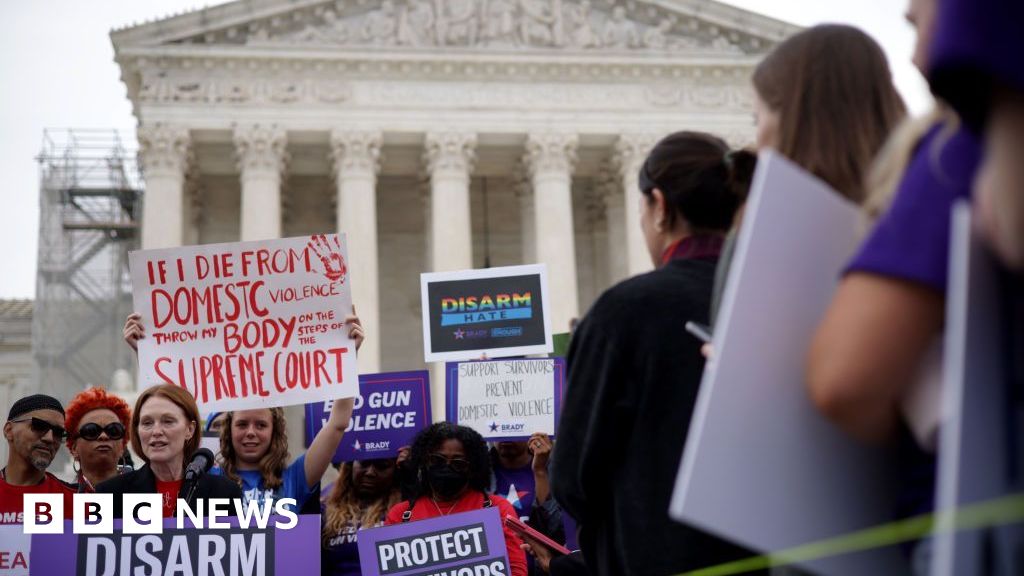The Supreme Court has ruled that people subject to restraining orders over alleged domestic violence have no right to own firearms.
The 8-1 ruling upheld a 30-year-old law that prohibits people with restraining orders stemming from domestic abuse from possessing firearms.
A lower court struck down the federal rule because it was “inconsistent with the nation’s historic tradition of gun control.”
Friday’s ruling marks a rare Supreme Court victory on gun restrictions.
Chief Justice John Roberts delivered the majority opinion, in which all but one of his colleagues concurred.
He wrote that the policy of disarming suspected domestic abusers was “common sense.”
“When an individual makes an explicit threat of physical violence against another individual, the threat-maker may be disarmed,” he said.
Justice Clarence Thomas, arguably the most conservative member of the court, was the lone dissenter.
“Today’s decision puts the Second Amendment rights of even more people at risk,” he wrote.
At the center of the case decided Friday is Zackey Rahimi, a Texas man with a history of armed violence against intimate partners and public shootings.
A court granted him a restraining order in 2020 after his then-girlfriend was dragged into his car during an argument near his home in Arlington, Texas, causing her to hit her head on the dashboard. He also shot a bystander who witnessed the attack.
Despite a court order that revoked his pistol license and prohibited him from owning any firearms, he retained the weapon and was involved in five public shootings later that year.
Rahimi, a small-time drug dealer, is currently serving a six-year sentence in a Texas federal prison after pleading guilty to violating a court order, according to court documents.
He is also awaiting state charges in connection with his shooting.
The Second Amendment to the U.S. Constitution guarantees the right to “keep and bear arms.”
In 2022, the U.S. Supreme Court dramatically expanded gun rights by ruling that the Second Amendment protects a broad right to carry a handgun outside for self-defense.
It also imposes new tests on gun laws, stating they must be rooted in “historic tradition.” Justice Thomas delivered the opinion.
Following the decision, Rahimi appealed his conviction, saying it failed the Supreme Court’s new test.
In a handwritten letter from prison last year, he also vowed to “stay away from all guns and weapons” upon his release.
During a hearing in November, Rahimi’s attorney, James Matthew Wright, said he could not find anyone who had been disarmed other than those convicted of felonies. Historical precedent – this does not include the subject of a restraining order.
But the U.S. government argued that “dangerous” individuals, such as those loyal to Britain during the American Revolution, had been disarmed in the past.
Government lawyers also say women who live in homes with armed domestic abusers are five times more likely to be murdered than other women.
The number of women killed by armed partners in Texas has nearly doubled in the past 10 years, according to the nonprofit Texas Council on Domestic Violence.
“Since our founding, our nation’s gun laws have included provisions to prevent the misuse of firearms by individuals who threaten to cause physical harm to others,” Justice Roberts wrote in Friday’s opinion.
“When a restraining order finds that a person poses a credible threat to the physical safety of an intimate partner, that person may be prohibited from possessing a firearm under the Second Amendment.”
He added that “some courts have misunderstood our recent approach to Second Amendment cases.” The 2022 precedent “is not meant to create a law that is trapped in amber,” he said.
Five different justices issued unanimous opinions, including two liberal justices, Sonia Sotomayor and Ketanji Brown Jackson, who said the blame for the chaos “probably lies with us” rather than other courts.
In his dissent, Justice Thomas noted that the majority’s ruling had “no historical basis.”
Many Second Amendment supporters were disappointed with the ruling, but some said it was narrow in scope.
Chuck Michel, president of the California Rifle and Pistol Association, posted on .
“It does not decide whether the government can ban broad classes of people from permanently owning weapons and rejects the government’s argument that ‘irresponsible’ people can be banned from owning weapons,” he said.
Brady, the nation’s oldest gun control group, hailed the decision as “an important victory for gun violence and domestic violence prevention.”
“Recently, courts have made many mistakes and upheld extreme rulings,” its chief legal officer Douglas Letter said in a statement.
“Yet even this court understands the reasonableness of this law and agrees that a proven approach to preventing gun violence is entirely constitutional.”

